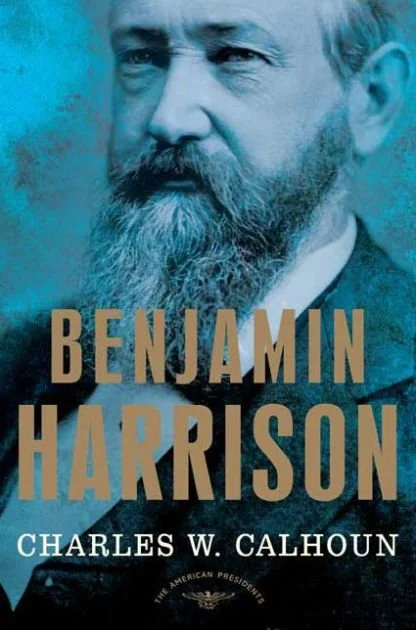Benjamin Harrison
Benjamin Harrison by Charles W. Calhoun
Tier 5
Benjamin Harrison was the great-grandson of William Henry Harrison, the ninth president who died after just thirty-one days in office. Unfortunately for Ben, that ignominious fact alone makes his great-grandfather a more well-known president than him.
If you’ve been reading my series on the presidents and their biographies, you will remember how often I have mentioned tariffs. This is because, aside from the Civil War and slavery, tariffs seem to have been the defining political issue of the nineteenth century. Nearly every biography discusses the president’s stance and legislation on tariffs.
In a way, this feels somewhat refreshing to me. Tariffs may be dull business, but at least they seemed to have a tangible effect on politics. I’m not sure I can say the same for today’s political arena.
Harrison’s tariff was known as the McKinley Tariff. It was named after William McKinley (more on him next week), and it raised the average duty on imports to almost fifty percent. This was meant to protect domestic industry and workers in the face of foreign competition. It is a prime example of protectionism, which was very much the Republican position at this time. The public did not like the McKinley Tariff as it caused an increase in the price of goods and led to inflation. As to whether or not it was one of the principal causes of the Panic of 1893, I cannot say. Economics is a complicated behemoth, and even in retrospect, the causes are heavily tainted by the politics of the historian.
There you go—some tariff talk. I’ve joked about tariffs quite a bit during this series, but I have to say some authors do manage to make it captivating. Tariffs have a tangible impact on the lives of citizens, and the long push and pull of protecting domestic industry and keeping costs low is interesting. I don’t know that I needed to spend as many hours as I did learning about them, but that is part of this project.
Calhoun doesn’t quite manage to make the tariffs all that interesting. Neither does he accomplish his apparent goal of reshaping Harrison’s legacy. He gives him substantial credit for his antitrust legislation, monetary policy, and tariffs. He also praises Harrison for his forward-thinking foreign policy—modernizing the navy, overseas expansion, and emphasis on the Monroe Doctrine.
It is no coincidence that these aspects of Harrison’s presidency are the ones Calhoun highlights. They are, of course, similar positions to those that Theodore Roosevelt held.
Teddy looms over all these post-Grant biographies, and I don’t blame the biographers for it. One may set out to write a biography on Benjamin Harrison, but in the back of your mind is always going to be the infinitely enthralling man to come. The swashbuckling cowboy who fought big business, built a canal, sailed down the Amazon… see, I’m doing it myself. Some giants loom over American history, and it is hard not to live in their shadows.
But let us give Harrison his due. The Sherman Antitrust Act was a monumental piece of legislation that remains in effect over 130 years after its signing. It was passed with bipartisan agreement and has been used countless times as a stalwart against monopolies and every growing stranglehold of big business. It does not guarantee a competitive arena or outlaw so-called “innocent monopolies.” Still, it does serve as a platform for the government to reign in monopolistic activities that abuse customers and artificially stifle competition. As with much legislation, some argue it went too far, others that it didn’t go far enough, but ultimately it was a step in the right direction.
Calhoun also points out Harrison’s work toward securing civil rights for blacks in the South. He endorsed the doomed Federal Elections Bill, proposed a constitutional amendment to overturn the Supreme Court ruling that gutted the Civil Rights Act of 1875, and tried to extend federal funding to all schools regardless of the race of their students. None of these attempts were successful, but Harrison never stopped pushing for Civil Rights.
Aside from that, I don’t have much to say about Harrison. He was known to be a man of integrity who was voted out of office because of his economic policies. He failed to win the popular vote in the election that put him in office, and while he laid some foundation upon which later presidents would stand, he is largely forgettable.
Calhoun sees him as a twentieth century president trapped in the nineteenth century. He thought his attempts at progressive legislation and imperialistic military expansion would’ve played well in the twentieth century. In this, he is correct. But, I believe he is retrofitting Harrison’s reputation around Roosevelt’s later success. It’s an admirable attempt, but it doesn’t work for me, and the book, in general, is a bit of a slog.
